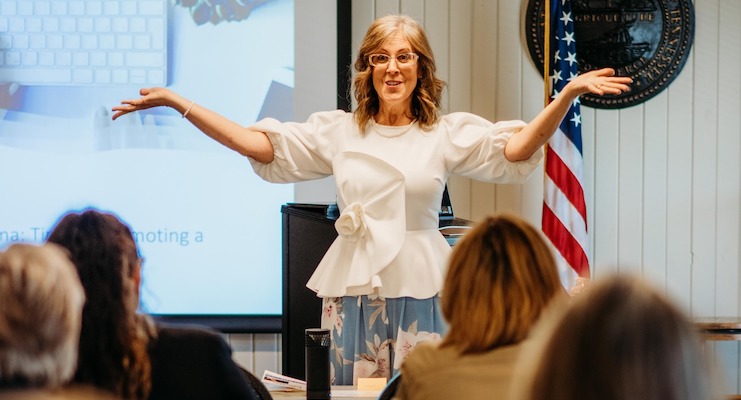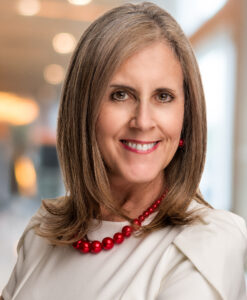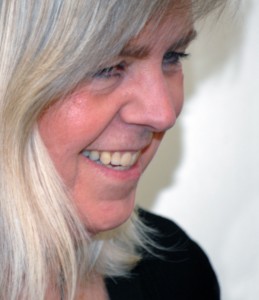
Vol. 21, Issue 7, Aug. 24, 2023
One doesn’t need to perk up their ears to hear the mention of mental health in the news these days. And there are certainly plenty of fears and worries in the air and on the air to give any one of us pause.
So it’s timely that today we’re featuring our speaker, Tami West, PhD, a  psychiatric survivor and an expert on stress & mental health. Her passion stems from a lifelong battle with an anxiety disorder, which has uniquely equipped her to teach, encourage, and motivate others.
psychiatric survivor and an expert on stress & mental health. Her passion stems from a lifelong battle with an anxiety disorder, which has uniquely equipped her to teach, encourage, and motivate others.
Coming out of the pandemic, she recently noted, mental health moved to the forefront of corporate employee issues.
Organizations reached out because they wanted to do something to help their employees cope with the massive changes that the pandemic brought to every facet of our lives. I’m sure we can all agree that there are plenty of reasons these days to keep mental health in the forefront of our minds.
Tami West, PhD
Mental Health is Real — Removing the Stigma
Tami West is an open book. She often opens her keynote with this statement: “In 1995, I was in a psychiatric institution with major anxiety disorder, panic disorder, PTSD, and depression. So welcome to the conference, I’m so glad you’re here!” She says it with glee in her voice.
It’s that disarming approach — and sense of humor — that establishes her credibility immediately.
Hers is a lifelong struggle. When I interviewed her recently, she recalled having her first panic attack at nine and continuing to have them throughout her growing-up years in Nashville, TN. And then the situation escalated in 1995 when she was 28 years old and married with three children.
In the fall of 1994, she had been doing her student teaching. For the first time in her life, she had received some criticism that was both unjustified and serious. It was her classroom supervisor telling her university supervisor that Tami lacked initiative – that she didn’t even belong in the classroom.
“She said it in front of my students,” Tami told me, “And the reason she said it was because she hadn’t seen any lesson plans from me. Unbeknownst to her, I had been staying up ‘til 2-3 in the morning doing lesson plans. However, I had not shared them because the supervisor had not asked me for them. In fact, I was relieved she hadn’t asked for them because I was terrified — I was afraid for her to see them because I was so unsure of myself.”
After that she dropped out of school. Then she tried again – and dropped out again. She ultimately graduated in the spring of 1995, but when she went to take her first actual teaching job, she completely fell apart.
She wasn’t able to leave her house, she didn’t eat, and she didn’t take care of her children. In August 1995, she was admitted to a mental health hospital. With the help of counseling (and for a time, medication) and a lot of hard work, she moved into the process of healing.
“I finally did accept a teaching position,” she said, “and taught quite successfully for ten years. However, anxiety isn’t something you are ‘cured’ of. I still deal with it to some degree every day.”
She eventually left teaching and started speaking, initially by doing contract work with a public seminar company. In her travels, she observed that the twin problems of mental health issues and rampant stress were affecting large numbers of people. With her personal history, she felt she could help people address these issues. Over time she grew her own client base and was speaking to associations, healthcare organizations, schools, and other entities.
In 2006, she began speaking around the world, primarily about stress and emotions.
“I like for my talks to have some research-based foundation,” she said. “I was hearing attendees talk about stress and say things like, ‘Must be nice,’ to someone who said they slept in that morning. I had some ideas about those types of phrases, but I couldn’t find any studies to support my thoughts. I wanted to be able to talk about why we talk that way and wanted something more grounded than just my opinion.”
So, in 2009 she went back to graduate school to study the connection between stress, identity, and language. She completed her study and received her Ph.D. in 2013. In 2017, based on her research she published The Stress Club, in which she teaches how to live a less-stressful life by introducing ways to think about and talk about stress through the power of language.
“I don’t think I’ll ever be in a mental hospital again,” she continued, “but mental health is a journey. I think that’s one of the big lessons for people to learn. I always thought I wanted to be ‘normal’ — I just wanted it to go away. I would look at everybody else and think, ‘Well, they’re working; they’re taking care of their family; they’re going to the grocery store.’ I just wanted to be like them.
“Well, now we know that that doesn’t mean that their mental health is great. It’s a journey. Even now, I have ups, I have downs, but I’m not going to let people shame me, ever again, into not taking care of my mental health.
“All these years, I’m just trying to learn and grow, and help other people, encourage people to take care of themselves, and remove the stigma. I repeat, don’t let people shame you into not taking care of your mental health.
“I’ve noticed that companies want to help their people speak up, and how impactful that can be. In one of the virtual programs I did, for example, the company had asked half a dozen employees to talk about their mental health experiences.
“What resulted from that was the recognition by everyone who heard them that anxiety is a huge thing  — people are struggling with worry and fear about what’s happening in their lives, what’s happening in their futures. To hear other people be open and transparent and share their stories was huge for them.
— people are struggling with worry and fear about what’s happening in their lives, what’s happening in their futures. To hear other people be open and transparent and share their stories was huge for them.
“I think that’s one of the biggest things — just being able to talk about it. Mental health issues are REAL. They’re painful. But there is also help, there are ways to get help and get through it.”
May is Health Awareness Month, and October 10 is World Health Awareness Day. Frankly, any day is a good day to pay attention to our mental health, and you can be confident in Tami’s ability to handle the topic with confidence, sensitivity, and humility. Her delivery is underpinned by her own experiences and academic insights, making them relatable, deeply transformative, and always sprinkled with humor.
As an author, educator, and podcaster, Tami has developed and delivered impactful live and virtual programs for diverse audiences, including the National School Nutrition Association, Danbury Federal Prison Inmates, Kaiser Permanente, and Social Security Administration, and she can do that for your organization too.
To book Tami for your organization, give me a call at 503-699-5031 or email me at barbara@speakwellbeing.com.
Taking Care of Our Mental Health
A MENTAL HEALTH RESOURCE
Tami highly recommends a quiz that’s called “The Mental Health Quotient (MHQ)”, run by Sapien Labs. Click on the link to access it.
It’s completely confidential. Your response will form part of the Global Mind Project (previously the Mental Health Million Project), providing insight into the mental well-being of the entire global population. You don’t even have to give your email unless you want to receive the detailed report. And the Sapiens Lab will not flood you with other email.
Tami said that she had learned from it that there are six dimensions to taking care of ourselves. When you can see your score in each one, you can identify the area or areas that need attention.
I took the MHQ myself and found it to be reassuring. It reported that my mental health is good, despite my occasional short-temperedness and my (justified, I’m sure) worry about the state of the world.
From the Sapiens Lab website: “Mental wellbeing is the ability to handle life and its various stresses and challenges. The MHQ is therefore a snapshot of your self-perception along various dimensions of mental function that determine your mental wellbeing. It is not a measure of happiness or life satisfaction. You could, for example, be experiencing very difficult or sad circumstances in your life but nonetheless have all the capabilities to cope as best as one could, and therefore have a high level of mental wellbeing.”
Just for reassurance, I’ll add that I have not received any emails from them since.
Until next time, I urge you to take care of your own mental health, for your wellbeing and those your love.
Yours truly,
Barbara

The Speak Well Being Group is a specialized speakers bureau, focusing on health and wellness for all types of organizations that want to foster health and well being for their employees, members, clients, and in their communities.
Our speakers are hand-selected. They are not only experts in their fields; they connect with their audiences while bringing them life-changing information, smiles of recognition, and ultimately a sense of well being and hope.
Finding the perfect keynote speaker for your special event or conference is my personal passion, not just once, but year after year. It brings me great joy to know that your audience was delighted and moved by the speaker we selected together. I’m committed to making the process easy, pleasant and fun.
